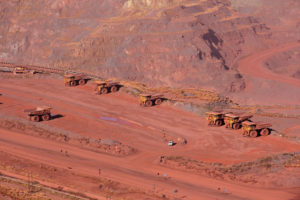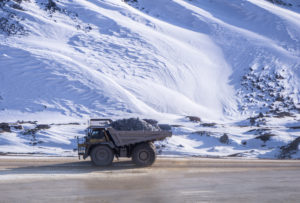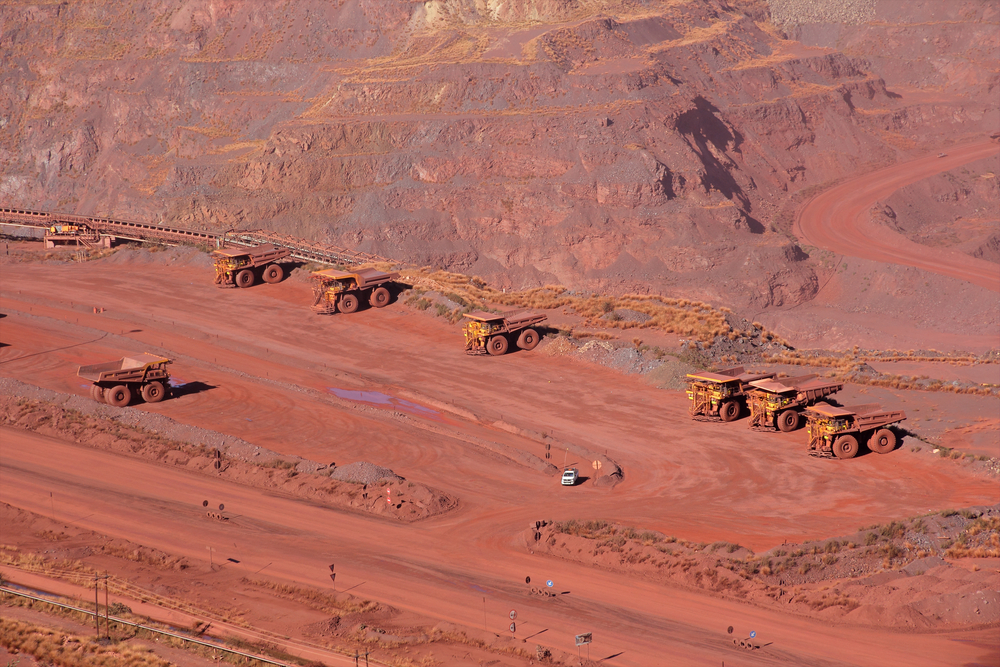When it comes to crafting heat exchangers to withstand some of the most intense conditions that iron ore mining has to offer, there’s nowhere better to be than the American epicenter of iron ore mining in Hibbing, Minnesota.
Located in Hibbing, on Minnesota’s Mesabi Iron Range, L&M Radiator is the leading provider of heat exchangers in the international iron ore mining industry. Iron ore mines around the world and in L&M Radiator’s backyard rely on its complete line of Mesabi® heat exchangers to keep heavy-duty mining equipment and haul trucks running 24-hours a day, 7-days a week.
If You’re Going to Serve the Iron Ore Mining Industry, You Better Be Prepared
While many competitors have come and gone, L&M Radiator stands the test of time by clearly understanding the incredible demands of operating heavy-duty equipment in iron ore mines. For 65 years, L&M Radiator has innovated new solutions to cut downtime and ensure that its heat exchangers are built tough enough to withstand whatever a tough mining environment can throw at them.
To mine iron, rock is shattered using explosives, leaving the ore in pieces small enough to process. Shovels scoop the ore into haul trucks, which then transport the ore to a nearby processing plant where the iron ore is processed for in preparation to make steel. Iron ore varies across the world. On Minnesota’s Mesabi Iron Range the iron ore is low-grade taconite that is concentrated and processed into pellets before being sent to a steel mill. In other parts of the world where iron ore is of higher grade, it is mined, crushed and sent straight to the steel mills.
“When it comes to mining taconite iron ore, we’re talking about hard and abrasive rock,” said Gary Fairchild, OEM Sales Manager for L&M Radiator. “In coal and other forms of mining, when you’re loading a truck you’re dumping in relatively softer and lighter material. On the other hand, iron ore is heavy, hard and destructive. Even the toughest haul trucks take a beating.”
Fairchild has been with L&M Radiator for 48 years. Born and raised in Hibbing, Minnesota, Fairchild’s job has taken him all over the U.S. and Canada where he’s seen firsthand the rough and tough conditions of North America’s mining operations. His decades of experience living on the Iron Range and selling Mesabi flexible core heat exchangers have equipped him with a complete understanding of exactly how Mesabi products collaborate with mining equipment to foster longevity and durability that crushes the competition.
“Our location on the Mesabi Iron Range means our process is intimately informed by the mining work being performed outside our company doors every day. It is a huge advantage and honor to be able to see Mesabi products at work at America’s most prolific iron range and so close to our headquarters,” said Fairchild. “It means we can literally see how our products are performing and that allows us to keep perfecting them. It’s not uncommon for Mesabi heat exchangers in mobile mining equipment to outlive two or three engines. That’s how tough, durable and reliable they are.”
Uncrushable Heat Exchangers Save Time and Money in the Field
Iron ore mines are dusty, rough and rugged, and the iron itself is extremely heavy by nature. Though these harsh conditions put a lot of pressure on the machines that keep the industry running, dirt and rubble are no match for Mesabi radiators, which are built to endure anything and everything that an iron ore mine can throw at them.
“Iron ore haul trucks operate in stressful environments. They literally run 24 hours a day, 365 days a year,” said Fairchild. “They get stressed because of the heavy loads they carry. The bumping, jarring, twisting and turning create constant vibration, which in turn can prove very damaging to an engine and other heavy-equipment parts and components.”
This constant vibration typically wears down the truck’s heat exchangers, costing the mining operation hours, if not days, on repairs and tens of thousands of dollars per hour that a haul truck might be down.
But not if they use Mesabi radiators.
“Other radiators are soldered or brazed together, creating a rigid metal bond at the tube to header joint. It just happens that this bond ends up being the machine’s weakest link. The bond can crack and leak due to continuous vibration, stress and thermal fatigue,” said Fairchild. “On the other hand, Mesabi heat exchangers use rubber seals at the tube to header connection, which serves as a shock absorber. They absorb all the vibration, movement and thermal expansion that a haul truck, bulldozer or other heavy-duty equipment experiences in an iron ore mine. They truly outperform any other heat exchanger or radiator on the market.”
“Our warranty is five years, which is 25,000 hours, but our heat exchangers go well beyond that,” added Fairchild. “I’ve witnessed some of our radiators in an iron ore mine that have been in use more than 20 years.”
Built to last the life of the equipment they are installed on, damage to a Mesabi heat exchanger is unlikely. But in the event that damage does occur, Mesabi heat exchangers are easily repairable in the field, reducing downtime due to damage from days to as little as one hour.
“If you do end up damaging a Mesabi heat exchanger, you don’t have to take it off the equipment, replace it or send it off to be fixed like our competitors,” said Fairchild. “We eliminate a lot of downtime maintenance costs from cooler damage and outright failure.”
Mesabi Parts Are Used Every Step of the Way
Mesabi heat exchangers’ advanced shock-absorbing technology is just one reason why they are used during every step of the iron ore mining process. From the shovels that scoop the iron ore and the haul trucks that carry it to crushers and mills that process it and the hydraulic coolers on ship-loading equipment at the ports, Mesabi heat exchangers provide the certainty of high performance that iron ore mines worldwide have learned to count on.
“We’ve got Mesabi products throughout a mine, not just on the big, heavy-duty equipment such as haul trucks, but also inside the ore processing plants, too,” said Fairchild. “Any piece of equipment where you need to control how hot or how cool that equipment needs to be to operate properly, it’s likely you’ll find a Mesabi heat exchanger. We even have hydraulic coolers on the machines they use to load the ships for transport overseas.” 
Mesabi V-Tube and Tube-and-Shell Technology Crushes Market Competition with Quality
“What type of heat exchanger is most appropriate depends upon the mine itself, what they’re running, what type of mine situation it is. We cover every possible application and have the best available product for every situation,” said Fairchild. “That’s why you’ll see Mesabi heat exchangers not only in the US, but also in some of the largest mines in the whole world: Canada, South America, Africa, and Australia as well.”
Though copper tube coolers are popular in the iron ore industry for their efficiency and serviceability, many iron ore mines are implementing Mesabi aluminum tube coolers for their lighter weight. Fairchild notes that eliminating weight from the front of the machine, where the heat exchanger sits, improves handling and increases usable payload.
As far as model type, Fairchild prizes both Mesabi M-Tube, V-Tube™ and All-Aluminum M-Tube (AAM) coolers for different mining environments.
“As you might imagine, iron ore mines are dirty, muddy places where the iron ore dust just seems to get into every nook and cranny,” said Fairchild. “While our M-tube design is primarily specified for iron ore mining haul trucks and heavy-duty equipment, we’re seeing a rise in the use of our V-Tube radiators because they are so easy to clean. The tubes have a V-shape design that allows for the radiators to be easily cleaned with high-pressure water or air.”
Mesabi Removable Tube, Tube and Shell (RTTS®) are the holy grail for in-plant and mobile equipment heat exchange due to their leak detection and high-performance abilities, noted Fairchild.
“We have Tube and Shell Coolers on the gearboxes at several of the local iron ore mining plants, such as in the pelletizer,” said Fairchild. “If you ever watch iron mining documentaries, maybe at night on the news or on YouTube, they always show a shot inside the plant where they have these gigantic mills turning. And it’s the gearboxes driving those big kilns and mills.”
“What the Mesabi System Protector™ Tube and Shell Cooler does, if it leaks, there’s a chamber that alerts you of the leak,” added Fairchild. “This stops you from getting the coolant into the oil of the $250,000 gearbox. Once you are alerted, you can repair the cooler and put it back online in no time, without contaminating the oil. Getting rid of used oil costs even more than putting new oil in, so it saves you both ways and it doesn’t destroy your gearbox.”
Minnesota-Born Technology is Standard for The Industry’s Largest Players
Because of the incredible market demand for Mesabi heat exchangers, Mesabi products come standard on most haul trucks used for iron ore mining. Mesabi heat exchangers are typically standard or available on Caterpillar®, Komatsu, Hitachi, and Liebherr heavy-duty mining trucks.
“The benefit of using Mesabi heat exchangers is so apparent, and the difference between the quality of our products versus the competition is so drastic, that companies started spec’ing us at the OEM level. That’s what led to us being standard on many OEM models,” said Fairchild. “I actually have customers calling, and they’re saying to Caterpillar, ‘I want a Mesabi heat exchanger on my 400-ton haul truck.’ People demand our product because it is truly the best available. It will save you so much time and money in the long run.”
Explore Mesabi Heat Exchangers
Iron ore mining is just one of the many industries that Mesabi heat exchangers can tackle. Learn how Mesabi heat exchangers meet the demands of aggregate mining, here.

